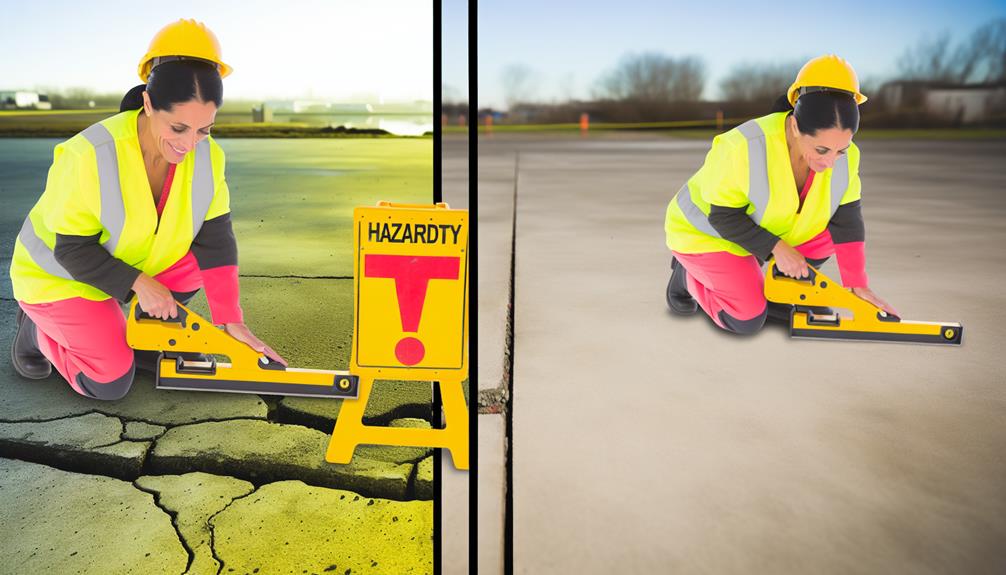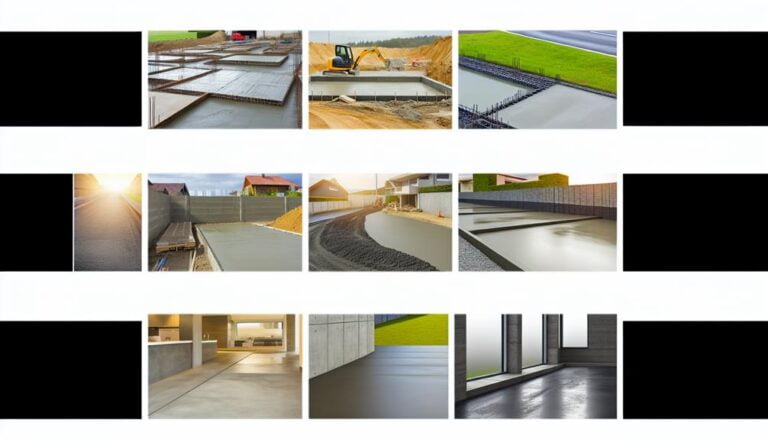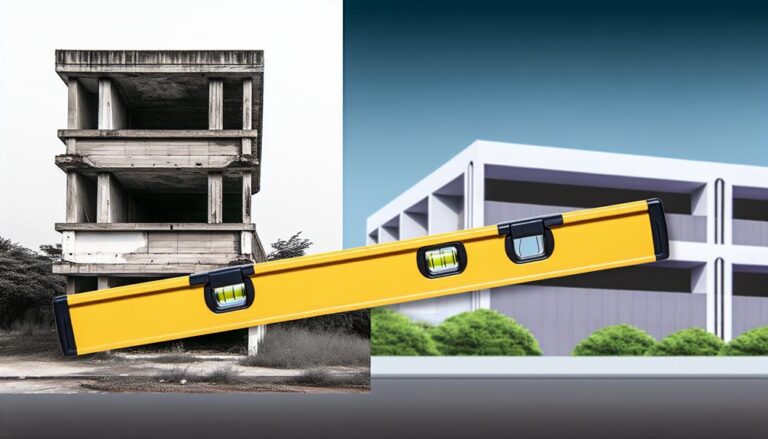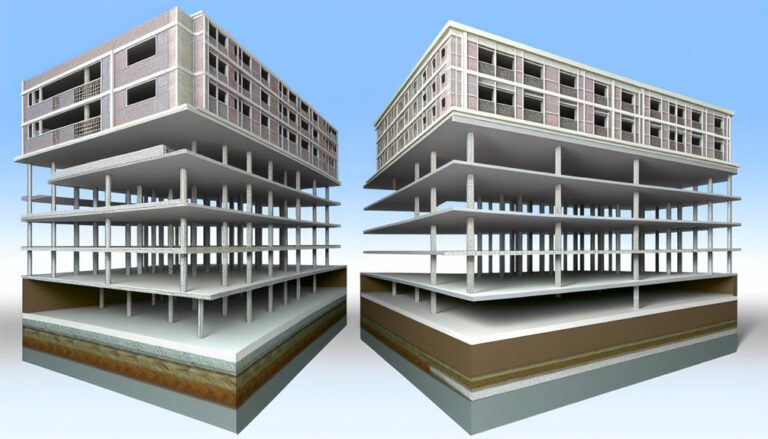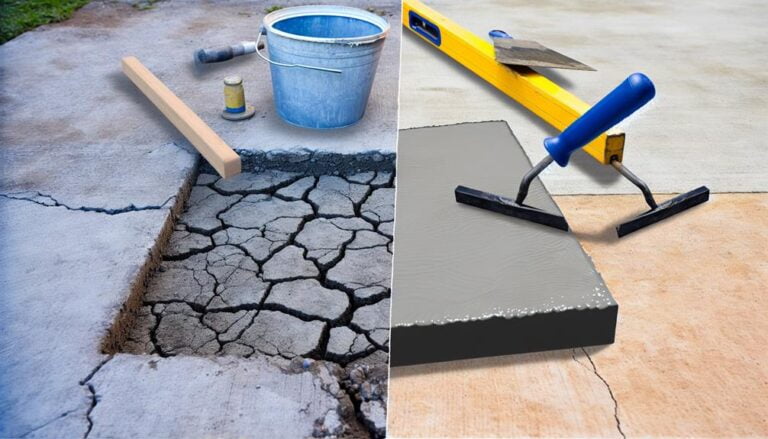Why Opt for Practical Concrete Leveling Techniques?
Choosing practical concrete leveling techniques is wise. They're cost-effective, avoiding the hefty price tags and downtime associated with slab replacement. These methods are environmentally friendly, limiting waste and carbon emissions. They also make your property safer by eliminating trip hazards and allowing efficient water flow. Plus, smoother surfaces boost curb appeal, potentially raising property values. Solutions like slabjacking and polyurethane foam injection are especially efficient and long-lasting. Sticking around, you'll uncover even more advantages of these ingenious techniques.
Understanding Concrete Leveling Techniques
In understanding concrete leveling techniques, it's important to know that these methods are designed to rectify uneven concrete surfaces by altering the foundation that the surface sits upon. They're not about patching up the top layer, but about getting to the root of the problem. And that's where you come in.
You're likely dealing with sinking, shifting, or cracking in your concrete. These issues can be due to a variety of factors such as soil erosion, freeze-thaw cycles, or poor initial installation. But don't worry, concrete leveling techniques can help you fix these problems.
First up, there's slabjacking. It's a process where a mixture is pumped into holes drilled in the concrete, raising the slab to its original level. It's quick, efficient, and doesn't require the slab to be replaced.
Then there's polyurethane foam injection. This technique involves injecting a high-density foam under the concrete. The foam expands, lifting the slab to the right level. It's a great option if you're looking for a long-lasting solution.
The Cost-Effectiveness of Concrete Leveling
You might be wondering about the cost-effectiveness of these concrete leveling techniques. The truth is, they're not just practical, but also highly cost-effective. Traditional methods of addressing uneven concrete, like complete replacement, can be expensive, consuming both time and money.
Concrete leveling, on the other hand, is a far more economical choice. The process requires fewer materials and less labor, significantly reducing overall project costs. You won't need to worry about the expense of removing old concrete and pouring new one. Plus, there's no need to wait for the new concrete to cure, which can take several days. Concrete leveling techniques let you use the surface almost immediately, saving you time and hassle.
Moreover, these techniques extend the lifespan of your concrete, thus further diminishing long-term expenses. By fixing uneven slabs, you're preventing further damage, reducing the need for future repairs or replacements. So, you see, the initial investment in concrete leveling pays off in the long run by minimizing future costs. Rest assured, opting for these practical concrete leveling techniques is a wise and cost-effective decision.
Environmental Benefits of Concrete Leveling
Beyond its cost-saving advantages, concrete leveling also presents significant environmental benefits worth considering. First off, you're conserving resources. By leveling concrete instead of replacing it, you're reducing the demand for new materials. That's a win for Mother Nature.
Secondly, concrete leveling reduces waste. Imagine all the old, broken concrete that doesn't end up in landfills because you've chosen to repair instead of replace. You're doing your bit to minimize waste.
Finally, did you know that concrete leveling can also reduce carbon emissions? Here's how. The production of new concrete releases CO2. By opting for leveling, you're cutting down on CO2 production.
Check out this table to get a clearer picture:
| Benefit | What it means | Why it's important |
|---|---|---|
| Resource Conservation | Less demand for new materials | Helps preserve natural resources |
| Waste Reduction | Old concrete doesn't end up in landfills | Helps minimize waste |
| Lower Carbon Emissions | Less new concrete production | Helps cut down CO2 production |
There you have it. Concrete leveling isn't just practical and cost-effective, it's also environmentally friendly.
Increasing Property Value With Concrete Leveling
Boosting your property's value might be easier than you think with concrete leveling. This practical technique not only rectifies uneven surfaces but also adds a polished finish to your property. You'll find that a well-leveled concrete floor or driveway significantly enhances your property's aesthetic appeal. It's this curb appeal that catches the eye of potential buyers, leading to a higher property value.
Uneven surfaces can be a serious turn-off for potential buyers. They're often seen as signs of neglect and may lead to potential safety hazards, which can lower your property's price. In contrast, a well-maintained, level concrete surface gives the impression of a well-cared-for property.
Moreover, concrete leveling is a cost-effective way to increase your property's value. Compared to concrete replacement, leveling is less labor-intensive and much cheaper. You're not just saving on upfront costs – you're also avoiding the potential future costs of addressing uneven concrete.
Safety Advantages of Concrete Leveling
In addition to enhancing property value, concrete leveling significantly improves safety by eliminating tripping hazards. Uneven concrete surfaces can be a dangerous liability, causing accidents and injuries. But when you opt for concrete leveling, you're taking a proactive step in preventing these mishaps.
Concrete leveling restores your walkways, driveways, and patios to their original condition, ensuring a smooth and level surface. This eliminates the risk of tripping over uneven slabs or gaps in the concrete. It's a practical and effective solution that not only makes your property safer but also contributes to its aesthetic appeal.
Furthermore, concrete leveling minimizes the risk of accidents during adverse weather conditions. For instance, an uneven surface can become slippery when wet, making it hazardous to walk on. But with leveled concrete, you won't have to worry about such issues.
Concrete Leveling for Improved Drainage
Another advantage of concrete leveling, often overlooked, is its positive impact on drainage around your property. When your concrete is uneven, water can pool in certain areas, leading to potential damage and even foundation issues. Concrete leveling can correct these imbalances, allowing for efficient water flow.
Consider it this way: as rain or irrigation water washes over your property, it needs somewhere to go. If your concrete slabs are uneven, that water mightn't drain correctly. It can pool on the surface or seep into the ground unevenly, causing soil erosion or instability. This could lead to more serious structural problems down the line.
But, when you level your concrete, you're essentially creating a smooth path for water to travel. It's directed away from your property, typically towards the street or a designated drainage area. This helps to prevent water-related damage and maintains the integrity of your property's landscapes.
Longevity and Durability of Leveled Concrete
With proper leveling, your concrete not only looks better, but it also lasts longer and withstands wear and tear more effectively. Leveling enhances the lifespan of your concrete, reducing the need for constant repairs or replacement. This longevity is a key benefit, making it a worthy investment for any property.
Concrete leveling also improves durability. A leveled surface is less prone to cracking and damage from heavy loads. It's a resilient solution, able to endure harsh weather conditions, and heavy foot or vehicle traffic. This durability saves you both time and money in the long run.
Let's break it down in a simple table:
| Longevity Benefits | Durability Benefits |
|---|---|
| Extends lifespan of concrete | Less prone to cracking |
| Reduces need for repairs or replacement | Can handle heavy loads |
| Cost-effective in the long run | Resilient to harsh weather conditions |
Concrete Leveling in Commercial Settings
You'll find that concrete leveling plays a crucial role in commercial settings, enhancing the functionality and aesthetic appeal of your business premises. Uneven surfaces or cracks in concrete can pose safety risks, potentially leading to accidents or injuries. Therefore, maintaining a level and smooth surface is essential to ensure the safety of your employees and customers.
Concrete leveling is also a cost-effective solution in a commercial setting. Rather than replacing the entire concrete slab, which can be expensive and time-consuming, leveling can restore the surface to its original state at a fraction of the cost. Plus, it's less disruptive, so you won't have to close your business for days or weeks for the repair work.
Moreover, a well-maintained concrete surface boosts the professional image of your premises. It gives the impression that you care about the smallest details, which can reflect positively on your business reputation. From manufacturing plants and warehouses to retail stores and office buildings, concrete leveling is a practical technique you can't afford to ignore. So, consider concrete leveling as a valuable investment that adds to the safety, efficiency, and appeal of your commercial establishment.
Residential Applications of Concrete Leveling
In your home, concrete leveling can be a game-changer, transforming uneven driveways, walkways, and patios into smooth, safe surfaces. You'll be amazed at how efficient and cost-effective this technique can be. No more tripping over lumps or dips; instead, you'll enjoy a level and attractive surface.
Concrete leveling isn't just about aesthetics, though. It's also a practical solution for preventing water pooling, reducing the risk of water damage to your property. Plus, it helps to prolong the life of your concrete by reducing the stress on it.
Let's take a closer look at where concrete leveling can be used in your home:
| Application | Benefits |
|---|---|
| Driveways | Prevents vehicle damage, reduces wear and tear |
| Walkways | Enhances safety, prevents tripping hazards |
| Patios | Improves aesthetics, enhances usability |
| Garage floors | Prevents water pooling, reduces damage risk |
Innovations in Concrete Leveling Techniques
As technology advances, so do the techniques used in concrete leveling, offering more efficient and precise methods to ensure a perfectly level surface. You'll find that these modern methods aren't only practical but can also save you time and money in the long run.
One of these innovations is the use of laser-guided systems. This technology allows for precision leveling, ensuring an even surface each time. It's a game-changer, eliminating guesswork and minimizing the risk of human error.
Another development is the use of lightweight, self-leveling compounds. These are easier to apply, don't require heavy machinery and set faster than traditional materials. They're ideal for both small-scale residential projects and larger commercial ones.
Hydraulic and polymer injection techniques are also making waves. They're less invasive, meaning less damage to your property. They work by injecting a material under the concrete to lift it to the desired level. It's a quick and effective solution, especially for settling or sinking slabs.
Frequently Asked Questions
What Kind of Training or Certification Is Required to Perform Concrete Leveling?
You're curious about the training needed for concrete leveling, right? Typically, no specific certification is required. However, it's beneficial to have a good understanding of concrete construction.
Some companies offer training programs on their specific equipment and methods. You'll learn about concrete mixing, application techniques, and safety protocols. It's not just about leveling concrete, it's about doing it correctly and safely.
Experience and hands-on training can boost your skills significantly.
How Does Weather Affect the Process and Outcome of Concrete Leveling?
Weather significantly impacts concrete leveling. In cold weather, it's harder for the concrete to cure, affecting the quality and durability of the leveling.
Rain can wash away uncured concrete, ruining the leveling process. Hot, dry weather can cause the concrete to dry too fast, leading to cracking.
Are There Any Potential Negative Effects of Concrete Leveling?
Just like a double-edged sword, concrete leveling has its setbacks too. You might encounter surface damage if it's not properly executed. There's also a risk of over-elevation, causing a whole new set of issues.
It can potentially damage nearby structures, and let's not forget, it's not a permanent solution. Over time, you'll have to relevel your concrete. But remember, with the right expertise and technique, these issues can be minimized.
Is There a Best Time of Year to Have Concrete Leveling Done?
Sure, there's a best time to do concrete leveling. You'd ideally want to schedule it during warmer months. Cold weather can cause concrete to freeze and crack, making it harder to work with. Also, rain can interfere with the process.
Can Concrete Leveling Be Performed on All Types of Concrete Structures, Such as Bridges or Tall Buildings?
You're barking up the right tree, concrete leveling can indeed be used on various types of structures like bridges or high-rise buildings. It's not just for driveways or sidewalks. The technique's versatility is one of its main selling points.
However, it's not a one-size-fits-all solution. The specific method used depends on the structure's condition and the severity of the unevenness. Always consult with a professional before making a decision.
Conclusion
So, you've seen the advantages of concrete leveling, from cost-effectiveness to environmental benefits and more.
But what's next? Will you let your property value dip and safety risks increase? Or will you choose a durable solution that stands the test of time? Whether it's for your commercial or residential space, the choice is yours.
Stay tuned as we delve into the latest innovations in concrete leveling techniques. Are you ready to level up?
